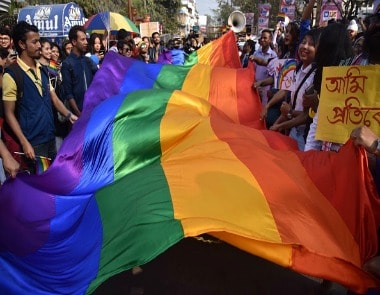The world over, 17 May is celebrated as IDAHOBIT — a rather cute acronym that stands for International Day Against Homophobia, Biphobia and Transphobia. Pay some attention, however, and you’ll find that most of the conversations on IDAHOBIT are centered around homosexuals and transgender individuals. Excluded from these narratives are bisexuals. Bisexuals are arguably the most misunderstood and discriminated against (and least addressed within) the LGBTIQA+ (lesbian, gay, bisexual, transgender, intersex, qeeer, asexual and questioning) spectrum. They are represented by colour purple. [caption id=“attachment_3783643” align=“alignleft” width=“380”]  Representational image. File Photo/Getty Images[/caption] Bisexuals are those who could fall in love with members of the same or another gender. While it may seem like they’d have fewer difficulties ‘fitting in’, the fact is bisexuals get the short end of the stick from heteronormative people, and the LGBTIQA+ community. For instance, a straight friend once told me, “I can understand homosexuality, but bisexuality is basically a state of being confused”. This is unfortunately one of the most common misconceptions about bisexuals. Bisexuality is not about being in a confused state of mind. It is about having the ability to love more than one gender. A female queer friend once ranted about another woman: “She hit on me but she had a boyfriend too. These bisexual women want the best of both worlds”. Another friend comforted this first one with the words: “They are never satisfied, laalchi auratein hoti hain.” Bisexuality doesn’t automatically mean “the need to have many” or it doesn’t mean that a person is a nymphomaniac. The fact is that even heterosexual women and men are attracted to more than one person. Heterosexuals and homosexuals also two-time or triple date. It’s only bisexuals who get labelled as “greedy”. _Letter to the Subalterns: To everyone who has the courage to come out as bisexual_ I am reminded of the time I got a distress call from a guy who broke up with his boyfriend when he found the latter looking at a heterosexual porn clip. The boyfriend also told this guy that he had begun to feel the stirrings of attraction towards women. The guy’s response to this was: “I will leave you now because you will eventually get married to a woman.” Bisexuality is often seen as a phase and heterosexuality, a convenience. Bisexuals are thus treated with mistrust and their natural attraction is seen as infidelity of a sort. Bisexuals could discover their attraction to another gender at any phase of their life. And yes, while there are chances that you could get married or start a more ‘socially acceptable’ (ie. heterosexual) relationship as a bisexual — that isn’t the rule. I know of several bisexual men and women who have committed relationships with members of their own gender. “Heard you are bisexual. Can I join in for a threesome?” — this is something that every lesbian or bisexual female friend has encountered at least once. Bisexuality is not an invitation for a threesome. But it is assumed that bisexuality is an invitation for a kinky ménage à trois. Then there’s the “No Bisexuals Please” messaging on hook-up apps like Grindr. Not all queer spaces are safe for and/or welcoming towards bisexuals. We may say we’re all LGBT, but the truth is that bisexuals (and also transgenders) are made to feel unwelcome at community events and on the dating scene. The so-called “safe” spaces are not really safe for bisexuals. They face rejection and the threat of misinformation from their peers. In the case of bisexual women, they face triple the amount of discrimination — 1. from society for being a woman, 2. for not being a heterosexual woman, and 3. from some lesbians who feel these women will “eventually marry a man”. Even bisexuals who are out and proud are regularly subjected to ‘pink labelling’ in the queer community — ie. referred to as gay or lesbian. It is unfortunate, yet not surprising that bisexuals are commonly ostracised and bullied. They’re also susceptible to mental health issues. Bisexuals are prone to mental illnesses. A report released by the Society for Prevention Research stated: “Bisexual individuals are at higher risk for poor mental health outcomes compared to heterosexual as well as lesbian and gay individuals and experience minority stressors, such as discrimination,from both heterosexual and sexual minority communities.” On IDAHOBIT, as we raise our rainbow and pink flags, let’s not forget the purple.
Pay some attention, however, and you’ll find that most of the conversations on IDAHOBIT are centered around homosexuals and transgender individuals. Excluded from these narratives are bisexuals.
Advertisement
End of Article


)
)
)
)
)
)
)
)
)



